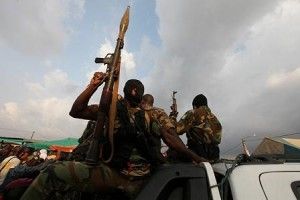Hundreds Massacred In Ivory Coast
DAKAR, Senegal — As rebels swept across Ivory Coast in a rapid advance last week to oust the nation’s strongman, Laurent Gbagbo, hundreds of people were killed in a single town, the United Nationsand aid groups said Saturday, in the worst episode of violence during the four-month political crisis that has plunged the country back into civil war.
The exact number of dead was unclear. The United Nations said that 330 people had been killed, while aid organizations put the death toll as high as 1,000.
The “town was full of bodies,” said Patrick Nicholson, a spokesman for Caritas, a Catholic charity whose staff members visited the town, Duékoué, in western Ivory Coast. “They saw bodies in the city, in the bush, mass graves.”
Humanitarian workers did not say who was responsible. But the United Nations said that more than 100 had been killed by Mr. Gbagbo’s fighters, while about 200 had been killed by forces loyal to his rival, Alassane Ouattara, the man recognized by the United Nations, the African Union and other international bodies as the winner of the presidential election last year.
Mr. Ouattara’s government issued a statement denying responsibility for atrocities in any part of the country, saying its forces had discovered mass graves in other towns that were the result of massacres by Mr. Gbagbo’s forces.
But the killings could call into question how much control Mr. Ouattara has over his forces and, if further investigation proved their involvement, tarnish his reputation overseas, where he is perceived to hold the high moral ground in the standoff with Mr. Gbagbo.
Throughout most of the crisis, civilian deaths have largely come at the hands of Mr. Gbagbo’s forces, eliciting threats of criminal charges from international prosecutors. Human rights groups have also accused forces loyal to Mr. Ouattara of some extrajudicial killings, but neither side has been implicated in a massacre even close to this scale. The total death toll previously estimated by the United Nations was about 500, over four months of tensions and sporadic violence.
Many of Mr. Ouattara’s fighters are former rebels from a 2002 uprising that divided the country in half, and they have come under his banner only recently. The rebels have a history of human rights abuses and had largely stayed on the sidelines of the political crisis.
Click here to read more.


